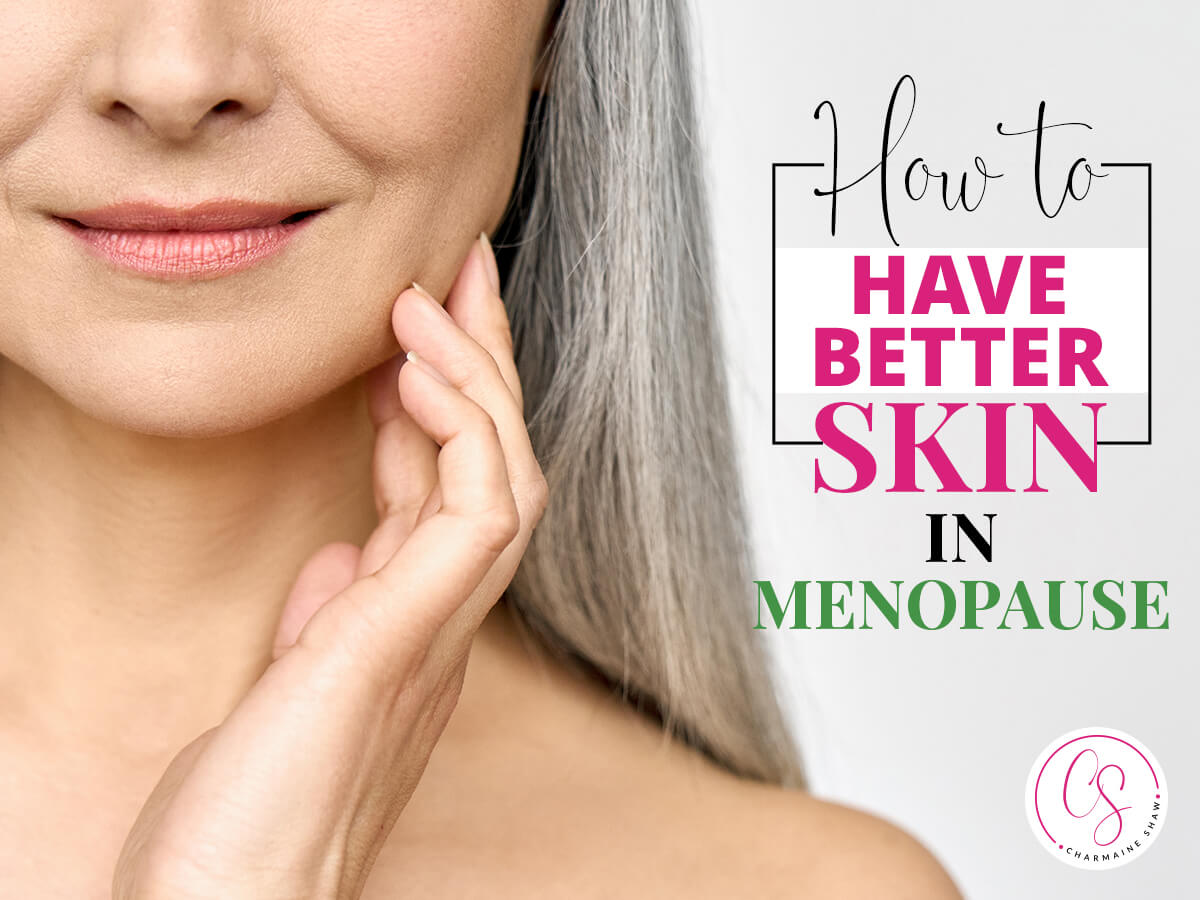Loss of collagen, dry, thinning and wrinkled are signs of your changing skin. The hormone estrogen is responsible for the rate of regeneration of skin cells, and a decrease in its level slows down this process. The growth of new cells is now slow, and the work of the glands that produce sebum will start deteriorating. The skin becomes dry and dull, wrinkles begin to appear due to lack of moisture. The hormonal changes also cause the loss of collagen that keeps skin firm, and subcutaneous fat that can fill out skin, so it doesn’t appear saggy. The combined result is sagging skin on the entire body, especially around the neck and jawline. Fortunately, you can become more proactive and help your skin look fresh and healthy.
Help Your Skin Age Well
Diet – As the saying goes, beauty begins on the inside, and this is especially true during menopause. Eat a diet that is organic, made up whole unprocessed macro and micro nutrients that will support hormone balancing as this will help the body’s ability to make more collagen and counter the signs of aging and hormone changes.
Vitamin C – Eat foods that are rich in vitamin C and sulfur, which are the building blocks of collagen. Foods that are high in C include citrus fruits, strawberries, kale and red peppers. For foods rich in sulfur, indulge in cauliflower, broccoli, arugula and lettuce.
Bone broth promotes collagen production that can help keep your skin firm and youthful. It is high in amino acids, which promote collagen production and contains gelatin, which can help your skin remain plump and counter sagging.
Peptides are amino acids that are part of your natural skin proteins, and when applied topically can improve your skin’s firmness. More peptides mean less skin inflammation and wrinkles because they help strengthen your skin’s protective barrier, which can weaken as we age. Choose a topical peptide serum that includes vitamin C for more effectiveness or take an oral supplement as they have been shown to reduce the pore size of skin and slightly increase the thickness of skin. (2)
Hyaluronic acid (HA) is a molecule that helps skin keep its moisture and plumpness. In the past, it was known that HA molecules were too large to penetrate the skin to help replenish this important molecule, but today’s technology has led to nano-hyaluronic acid that proves to penetrate and help your skin look younger in just eight weeks. (3)
MSM Supplement and Cream – MSM stands for methylsulfonylmethane, and is a compound that contains natural, dietary sulfur, which can help strengthen keratin proteins in your skin. This important nutrient is also widely used to reduce inflammation due to oxidative stress, which greatly expedites the skin’s aging process. Fortunately, research shows that even topical MSM can reduce wrinkling and improve skin elasticity! (4) MSM can be taken as a supplement and topically through creams.
Facials are a popular go-to for anti-aging skin care for numerous reasons. We are fortunate today to have access to numerous facial treatments that use collagen-infused serums, hyaluronic acids, light therapy and microdermabrasion as different ways to slow the aging process. Treat yourself at least once a month, if possible, to boost your skin’s health.
Get support: Navigating menopause or making changes can be overwhelming. Schedule a Free Consultation to see how my coaching can help or jump over to the online programs here and take the first step to reclaim your body, health and life.

References
2 Maia Campos PMBG, Melo MO, Siqueira César FC. Topical application and oral supplementation of peptides in the improvement of skin viscoelasticity and density. J Cosmet Dermatol. 2019;18(6):1693-1699. doi:10.1111/jocd.12893
3 Jegasothy SM, Zabolotniaia V, Bielfeldt S. Efficacy of a New Topical Nano-hyaluronic Acid in Humans. J Clin Aesthet Dermatol. 2014;7(3):27-29.
4 Butawan M, Benjamin RL, Bloomer RJ. Methylsulfonylmethane: Applications and Safety of a Novel Dietary Supplement. Nutrients. 2017;9(3):290. Published 2017 Mar 16. doi:10.3390/nu9030290
Please Note: The information presented here is for informational and educational purposes only and is not intended to be used as medical advice. Any statements or claims about the possible health benefits conferred by any products or lifestyle changes have not been evaluated by medical professionals or the Food & Drug Administration and are not intended to diagnose, treat, cure, or prevent any disease. You should consult your health practitioner before changing your diet, taking supplements, or starting any exercise or health program.

